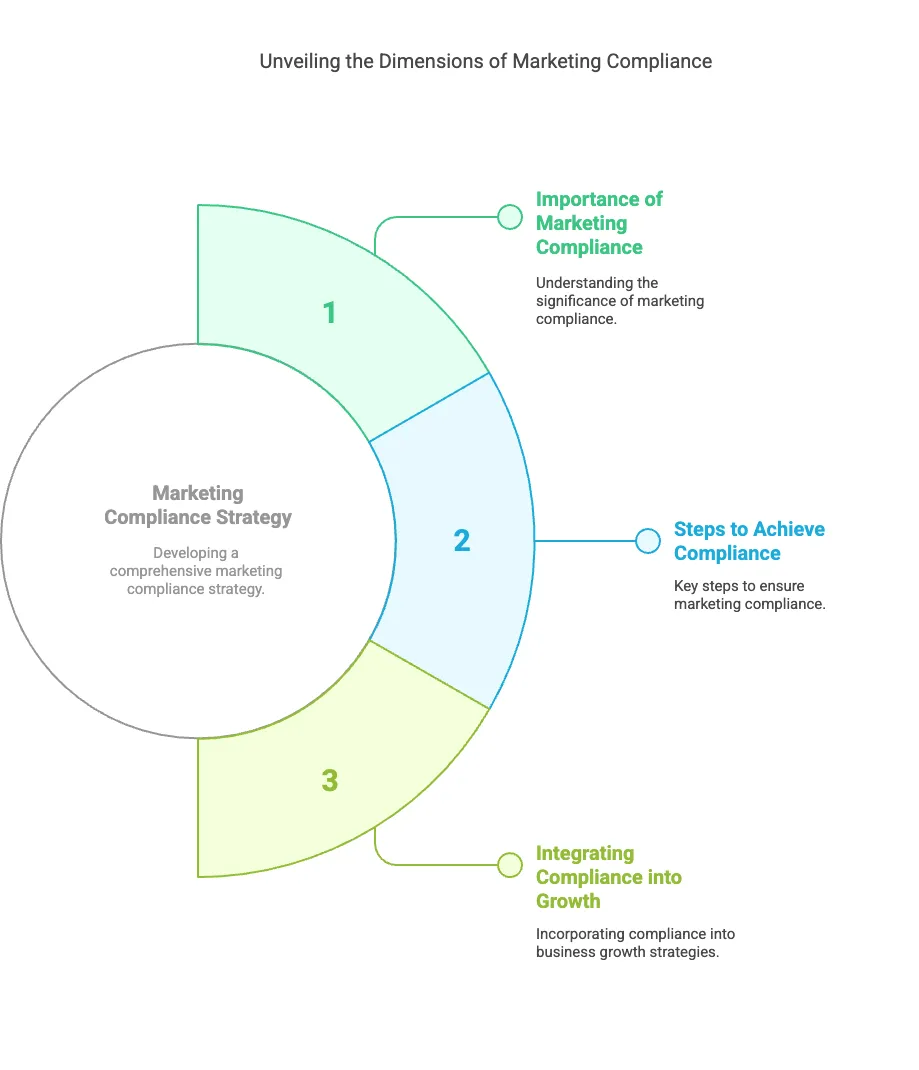Build Trust and Credibility
Marketing Compliance To Protect Your Brand
Avoid legal pitfalls and build customer trust with a clear, compliant marketing strategy. Learn how to align your campaigns with industry regulations and company standards—without slowing down your growth.
NOTE: This content was thoughtfully created to support small businesses and marketing professionals. Whether you're just getting started or refining your strategy, I hope it helps you move forward with confidence, clarity, and a solid plan for growth.

What Is Marketing Compliance?
Marketing compliance ensures that all your marketing activities—ads, emails, websites, promotions, and social media—follow legal regulations, industry standards, and internal brand guidelines. It helps your business stay aligned with data privacy laws, truth-in-advertising rules, and platform policies while protecting your reputation.
Steps to understanding and implementing a compliant marketing strategy:
• 1. Why Marketing Compliance Matters
• 2. Steps to Achieve Marketing Compliance
• 3. Make Compliance Part of Your Growth Strategy
1. Why Marketing Compliance Matters
AVOID LEGAL PENALTIES
Non-compliance can result in fines, lawsuits, or banned campaigns. Regulations like GDPR, CAN-SPAM, and FTC guidelines are serious—violating them can cost you.
BUILD TRUST AND CREDIBILITY
Customers are more likely to engage with businesses that treat their data respectfully and market transparently.
PROTECT YOUR BRAND
One mistake can go viral. Compliance protects your brand’s integrity and helps you maintain a positive public image.
KEEP TEAMS ALIGNED
With clear rules and processes, your marketing team, legal team, and partners all stay on the same page—reducing risks and wasted time.
2. Steps to Achieve Marketing Compliance
1. UNDERSTAND THE LAWS AND REGULATIONS
Know which rules apply to your business based on location, industry, and marketing channels (email, social, web, etc.).
2. SET INTERNAL GUIDELINES
Create a marketing compliance checklist or playbook that outlines what’s allowed and what’s not.
3. TRAIN YOUR TEAM Train Your Team
One mistake can go viral. Compliance protects your brand’s integrity and helps you maintain a positive public image.
4. REVIEW ALL MARKETING CONTENT
Before publishing, check your messaging, images, and targeting against your internal policies and legal requirements.
5. MANAGE CUSTOMER DATA RESPONSIBLY
Ensure you collect, store, and use personal data in line with privacy laws like GDPR, CCPA, and others.
6. USE COMPLIANCE-FRIENDLY TOOLS
Choose platforms and CRMs that support opt-in tracking, unsubscribe options, cookie management, and proper data handling.
7. AUDIT REGULARLY
Set a regular schedule to audit your marketing assets and adjust for any updates in laws or brand strategy.
8. DOCUMENT EVERYTHING
Keep a record of approvals, campaign history, and consent logs to prove compliance if needed.
3. Make Compliance Part of Your Growth Strategy
Marketing compliance isn’t just about avoiding fines—it’s about building a sustainable, trustworthy brand that can grow without disruption.
Here’s how to make compliance work for your business, not against it:
1. BUILD TRUST THAT FUELS CONVERSIONS
Customers are more likely to engage with businesses that are transparent and respectful of their data. Clear opt-ins, honest messaging, and easy opt-outs tell your audience: “We respect your time and privacy.” That level of trust drives higher conversion rates and customer loyalty.
2. STREAMLINE YOUR MARKETING OPERATIONS
By embedding compliance into your everyday processes—like automated approvals, pre-launch checklists, and clear team roles—you reduce friction and speed up campaign launches. Everyone knows the rules. There’s less back-and-forth, and fewer costly mistakes to fix later.
3. STAY AHEAD OF REGULATORY SHIFTS
Regulations are constantly changing. Businesses that treat compliance as a strategic function—rather than a last-minute task—can quickly adapt to new rules without slowing down. Being proactive means you can seize opportunities while competitors scramble to catch up.
4. STRENGTHEN YOUR BRAND REPUTATION
Modern buyers research brands before making decisions. Compliance shows up in everything from privacy policies to ad transparency. Being seen as a brand that “does things the right way” sets you apart in crowded markets—and builds goodwill that pays off long-term.
5. REDUCE LEGAL AND FINANCIAL RISKS
Lawsuits, platform bans, and penalties can devastate marketing momentum. By building a strong compliance foundation early, you protect your resources—and your ability to scale—without unexpected setbacks.
6. ALIGN TEAMS WITH SHARED VALUES
When your compliance guidelines reflect your company’s core values—like honesty, respect, and transparency—it helps unite your team. Marketing, legal, sales, and leadership can move in the same direction with less friction and more purpose.
THE BOTTOM LINE
Smart, compliant marketing is a growth tool—not a limitation. When compliance is built into your strategy, you can move faster, stay protected, and build deeper customer relationships that fuel sustainable success.
Want to know more? Let's Talk!
I’d love to meet you, hear about what you’re working on, and see how I can help support you.

Facebook
LinkedIn